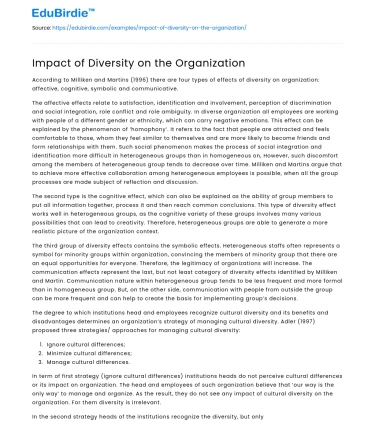According to Milliken and Martins (1996) there are four types of effects of diversity on organization: affective, cognitive, symbolic and communicative.
The affective effects relate to satisfaction, identification and involvement, perception of discrimination and social integration, role conflict and role ambiguity. In diverse organization all employees are working with people of a different gender or ethnicity, which can carry negative emotions. This effect can be explained by the phenomenon of ‘homophony’. It refers to the fact that people are attracted and feels comfortable to those, whom they feel similar to themselves and are more likely to become friends and form relationships with them. Such social phenomenon makes the process of social integration and identification more difficult in heterogeneous groups than in homogeneous on, However, such discomfort among the members of heterogeneous group tends to decrease over time. Milliken and Martins argue that to achieve more effective collaboration among heterogeneous employees is possible, when all the group processes are made subject of reflection and discussion.
Save your time!
We can take care of your essay
- Proper editing and formatting
- Free revision, title page, and bibliography
- Flexible prices and money-back guarantee
The second type is the cognitive effect, which can also be explained as the ability of group members to put all information together, process it and then reach common conclusions. This type of diversity effect works well in heterogeneous groups, as the cognitive variety of these groups involves many various possibilities that can lead to creativity. Therefore, heterogeneous groups are able to generate a more realistic picture of the organization context.
The third group of diversity effects contains the symbolic effects. Heterogeneous staffs often represents a symbol for minority groups within organization, convincing the members of minority group that there are an equal opportunities for everyone. Therefore, the legitimacy of organizations will increase. The communication effects represent the last, but not least category of diversity effects identified by Milliken and Martin. Communication nature within heterogeneous group tends to be less frequent and more formal than in homogeneous group. But, on the other side, communication with people from outside the group can be more frequent and can help to create the basis for implementing group’s decisions.
The degree to which institutions head and employees recognize cultural diversity and its benefits and disadvantages determines an organization’s strategy of managing cultural diversity. Adler (1997) proposed three strategies/ approaches for managing cultural diversity:
- Ignore cultural differences;
- Minimize cultural differences;
- Manage cultural differences.
In term of first strategy (ignore cultural differences) institutions heads do not perceive cultural differences or its impact on organization. The head and employees of such organization believe that ‘our way is the only way’ to manage and organize. As the result, they do not see any impact of cultural diversity on the organization. For them diversity is irrelevant.
In the second strategy heads of the institutions recognize the diversity, but only as a source of problem. Head of such organizations believe that ‘our way is the best way’ to organize and manage. In such strategy head of the institutions try to reduce the problems of differences just by reducing diversity. So, they do not think about what kind of advantages they can get from diversity. Such types of institutions try either to hire culturally homogeneous employees or try to socialize all employees into the behavior patterns of the dominant culture.
The last strategy shows organizations that recognize the impact of cultural differences, with its advantageous and disadvantages. Head of such institution believe that ‘our way and their way of behaving and managing differ, but neither is superior to the other’. Therefore, new creative combination of our way and their way may be the best approach to manage and organize. Institution head do not ignore the potential advantages of diversity; moreover, they are trying to minimize potential disadvantages of it.






 Stuck on your essay?
Stuck on your essay?

